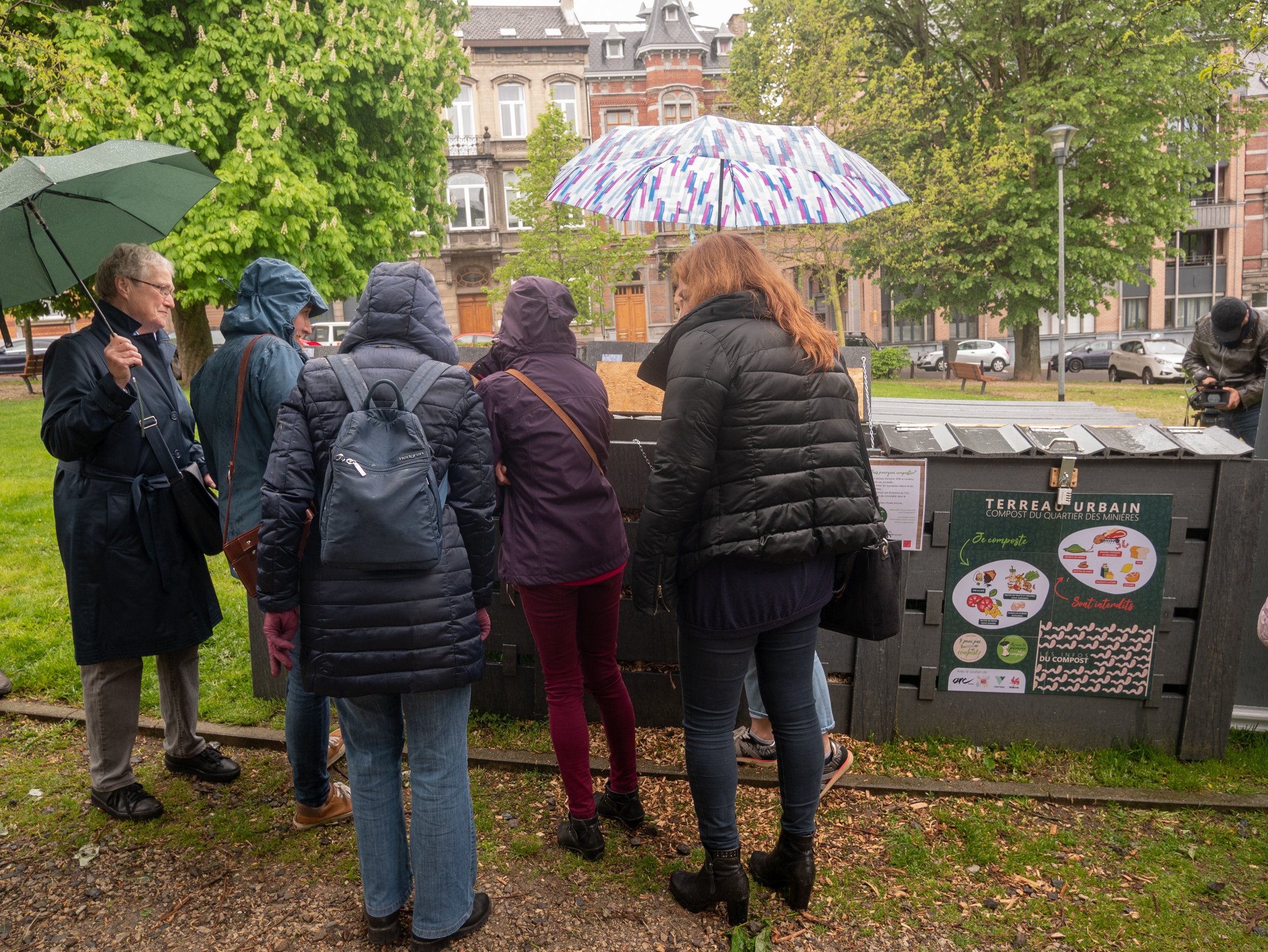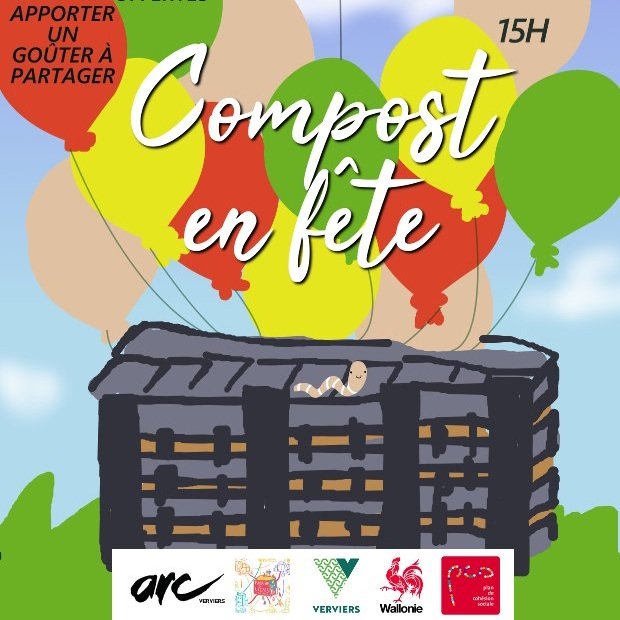Un Tout Petit Écosystème | A Tiny Ecosystem
by Esmeralda Wirtz
FRANÇAIS
Je n’ai malheureusement pas d’histoire à vous raconter qui concerne la plantation d’immenses forêts luxuriantes absorbant des milliers de tonnes de CO2 chaque année. Je n’ai pas non plus nettoyé l’océan de ses plastiques, ni restauré des milliers d’hectares de tourbières. Non. Le présent témoignage concerne un tout petit écosystème, avec des habitants minuscules, mais qui accomplissent un énorme travail, à leur échelle.
Les « nature-based solutions » semblent particulièrement adaptées aux grands espaces, aux zones peu investies par l’homme. Alors comment on fait quand on habite dans un pays où la densité de population, en constante augmentation, atteint aujourd’hui les 372 habitants au kilomètre carré ? C’est là qu’interviennent les cloportes, les moucherons, les scarabées, les vers, les bactéries ainsi qu’une multitude de champignons. Ah, j’allais oublier un habitant important de cet écosystème : l’être humain. Sans lui, aucune de ces bêtes ne serait arrivée là.
Je venais de déménager dans un appartement sans jardin ni terrasse. Dès les premiers jours, jeter mes déchets organiques dans la poubelle ordinaire m’a semblé être une aberration, à moi qui avais toujours composté dans le jardin de mes parents. Pourtant, il y avait plein d’espace, juste devant chez moi : une place enherbée avec quelques arbres, principalement fréquentée par les navetteurs et les propriétaires de chiens. Alors pourquoi pas composter ensemble, avec les voisins ?
Après des mois de réflexion, de recherche de partenaires, de prospection de solutions techniques, je parviens enfin à organiser une première réunion d’information avec quelques citoyens du quartier. C’est ainsi que nous allons travailler d’arrache-pied ensemble, pour la définition du projet. Où allonsnous installer le compost ? Qu’est-ce qu’on pourra y jeter ? Qui pourra participer ? Comment allonsnous assurer la pérennité du projet ?
Cinq mois plus tard, malgré quelques problèmes administratifs, nous construisons enfin les bacs et inaugurons le compost. Sous une pluie intense, une centaine de citoyens se sont réunis, manifestant leur intérêt à composter avec nous. Nous avons dû mettre en place une liste d’attente tellement les demandes étaient nombreuses, à cause de la capacité limitée de notre installation.
En ville aussi il est possible de mettre en place des solutions contre le changement climatique qui se basent sur les services que nous rend la biodiversité. Les petites bêtes du compost nous permettent ainsi d’économiser les émissions de CO2 liées au transport et au traitement des déchets organiques de 120 personnes, soit environ 5 tonnes de déchets par an ! Par ailleurs, nous récupérerons la terre pour amender nos propres plantes, absorbant encore du CO2.
ENGLISH
“In 2017, I moved to a flat without a garden in the center of Verviers, a town in eastern Belgium. I quickly noticed that there the waste management system wouldn’t allow me to sort organic waste, which I found really annoying. There was this public space right in front of my house, so I thought, why don’t we start a community compost all together, compost there and reuse the soil in our gardens, for those who have one.
After gathering citizens, and receiving funding and support from the municipality and a local non-profit organisation, we started defining the outlines of our project: where do we want the compost to be, how would we build it, who could access it… With a small group of 4-5 people, mainly women, we worked really hard to make the project come true. In April 2019, we finally managed to build the compost, and to organise an official opening. Despite the heavy rain, dozens of people showed up, and after just one week, enough people – 120 - had signed up to reach to capacity of the compost. We won the environmental prize of our Province just a few weeks later. In 2020, the demand was so high that we had to make the compost even bigger, to allow all the people of the waiting list to join our group. 3 more groups decided to start a compost in their neighbourhoods, based on the example that we set up.
Community composting helps prevent the emission of greenhouse gases from the transport and treatment of waste. We can use the power of soil biodiversity to create compost that can then be used to fertilise our plants. More importantly, it brings citizens together and shows us that we are part of nature, even when living in urban areas.
”
Unfortunately, I don’t have any story to tell concerning the creation of huge and lush forests, absorbing thousands of tonns of CO2 every year. I haven’t cleaned the ocean of its plastics either, and I also haven’t restored thousands of hectars of marshlands. No. This testimony concerns a very small ecosystem, with tiny inhabitants, but who accomplish a huge amount of work, at their scale.
Nature-based solutions seem really adapted to huge areas, where man in not very present. So, how do you do when you live in a country where density of population now reaches 372 inhabitants per square kilometer ? That’s where woodlouses, midges, beetles, worms, bacteria and many kinds of mushrooms take action. Oh, I almost forgot a very important inhabitant of this ecosystem : the human being. Without him, none of these living beings would have arrived there.
I had just moved into an appartment without any garden or patio. Since the first days, throwing my organic waste in the ordinary trash bin had felt like a complete nonsense, especially that I had always been composting in my parents’ garden. However, there was plenty of space, right in front of my place : a grassy square with some trees, mainly attended by saily travellers and dog owners. So, why not compost together, with my neighbours ?
After months of reflection, partner research, exploration of technical solutions, I finally managed to organise a first information meeting with a bunch of citizens of the neighbourhood. That’s where hard teamwork started to define the project. Where were we going to install the compost ? What can we throw in it ? Who can participate ? How are we going to ensure the sustainability of the project ?
Five months later, depite a few administrative worries, we finally built the bins, and inaugurate the compost. Under intense rain, close to a hundred of citizens gathered and showed interest for composting. The requests were so numerous that we had to start a waiting list, because of the limited capacity of our facility.
Cities can also host solutions against climate change, based on the ecosystemic services. The little animals of the compost allow us to avoid the CO2 emissions linked to transportation and processing of organic waste from 120 people, and that’s about 5 tons of waste every year ! Furthermore, we can use the produced soil for our own plants, absorbing even more CO2.
About
Find out more about Esmeralda’s project at: www.facebook.com/terreauurbain
I am Esmeralda (she/they) and I grew up in a low-income family in Belgium. This really shaped my interests, since we had to make savings about absolutely everything and nothing would ever go to waste. I then studied cultural anthropology and environmental sciences and I work for a nature park. In 2019, I got selected to represent Belgian youth at the UNFCCC COP25, and I worked on the intersections between climate change and biodiversity. I am now one of the coordinators of the European chapter of the Global Youth Biodiversity Network and I live in a tiny house on wheels.








